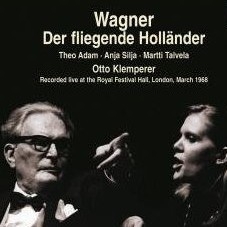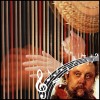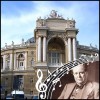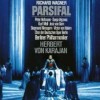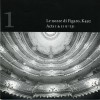Libretto
Der fliegende Holländer (The Flying Dutchman) is an opera, with music and libretto by Richard Wagner. The story comes from the legend of the Flying Dutchman, about a ship captain condemned to sail until Judgment Day.
Wagner claimed in his 1870 autobiography Mein Leben that he had been inspired following a stormy sea crossing he made from Riga to London in July and August 1839, but in his 1843 Autobiographical Sketch Wagner acknowledged he had taken the story from Heinrich Heine's retelling of the legend in his 1834 satirical novel The Memoirs of Mister von Schnabelewopski (Aus den Memoiren des Herrn von Schnabelewopski). The central theme is redemption through love, to which Wagner returns in most of his subsequent operas.
Wagner conducted the premiere at the Semper Oper in Dresden, 1843. This work shows early attempts at operatic styles that would characterise his later music dramas. In Der fliegende Holländer Wagner uses a number of leitmotifs (literally, "leading motifs") associated with the characters and themes. The leitmotifs are all introduced in the overture, which begins with a well-known ocean or storm motif before moving into the Dutchman and Senta motifs.
Wagner originally wrote Der fliegende Holländer to be performed without intermission — an example of his efforts to break with tradition — and, while today's opera houses sometimes still follow this directive, it is also performed in a three act version.
Synopsis
The action takes place on the coast of Norway.
Act 1
On his homeward journey, the sea-captain Daland is compelled by stormy weather to seek a port of refuge. He leaves the helmsman on watch and he and the sailors retire. (Song of the helmsman: "With tempest and storm on distant seas.") The helmsman falls asleep. A ghostly vessel appearing astern is dashed against Daland's vessel by the sea and the grappling irons hold the two ships together. Invisible hands furl the sails. A man of pale aspect, dressed in black, his face framed by a thick black beard, steps ashore. He laments his fate. (Aria: "The time has come and seven years have again elapsed") Having broken his troth, the ghost captain is cursed to roam the sea forever without rest. An angel brought to him the terms of his redemption: at the end of every seven years the angry waves cast him upon the shore; if he can find a wife who will be true to him he will be released.
Daland meets the captain. The ghost offers him treasure, and when he hears that Daland has an unmarried daughter named Senta, he asks for her as his wife. Tempted by gold, Daland consents, and favoured by the south wind joyfully acclaimed by Daland's men (repetition of the song of the helmsman and chorus), both vessels set sail.
Act 2
A group of local girls are singing and spinning in Daland's house. (Spinning chorus: "Summ und brumm, du gutes Rädchen", transl. "Spin, spin, fair maiden") Senta, Daland's daughter, dreamily gazes upon a gorgeous picture of the Flying Dutchman that hangs from the wall; she desires to save him. Against the will of her nurse, she sings to her friends the story of the Dutchman (Ballad with the Leitmotiv), how Satan heard him swear and took him at his word, she declares she will save him by her fidelity.
The huntsman Erik, Senta's former boyfriend, arrives and hears her; the girls depart, and the huntsman, who loves the maiden, warns her, telling her of his dream, in which Daland returned with a mysterious stranger, who carried her off to sea. She listens with delight, and Erik leaves her in despair.
Daland arrives with the stranger; he and Senta stand gazing at each other in silence. Daland is scarcely noticed by his daughter, even when he presents his guest as her betrothed. In the following duet, which closes the act, Senta swears to be true till death.
Act 3
Later in the evening, the local girls bring Daland's men food and drink. They invite the crew of the strange vessel to join in the merry-making, but in vain. The girls retire in wonder; ghostly forms appear at work upon the vessel of the Flying Dutchman, and Daland's men retreat in fear.
Senta arrives, followed by Erik, who reproves her for her desertion, as she had formerly loved him and vowed constancy. When the stranger, who has been listening, hears these words, he is overwhelmed with despair, as he thinks he is now forever lost. He summons his men, tells Senta of the curse, and to the consternation of Daland and his crew declares that he is the "Flying Dutchman."
Hardly has the Dutchman left the shore, when Senta arrives and throws herself into the sea, claiming that she will be faithful to him unto death. This is his salvation. The spectral ship disappears, and Senta and the Dutchman are seen ascending to heaven.





